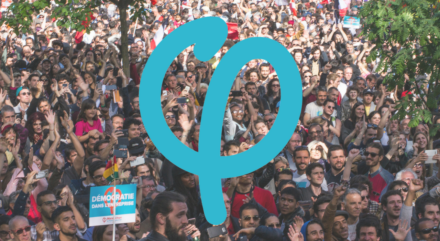
Next week’s The World Transformed conference will play host to France’s most popular political leader, France Insoumise’s Jean-Luc Mélenchon. Winning seven million votes in last year’s presidential election, the radical left-winger is today at the forefront of the revolt against Emmanuel Macron’s crisis-wracked government.
Mélenchon’s major breakthrough came in the 2017 contest, when he was under two points shy of beating Marine Le Pen into the second round. Even as the Socialist and Communist parties have waned, France Insoumise has eaten into the far right’s commanding position among the young and unemployed in small towns around France.
Mélenchon should, then, be more than welcome at Momentum and Labour events. Yet some don’t seem so sure. Last month Stephen Bush tweeted that the invitation showed “how little attention UK politicos pay to the continent” and suggested Socialist candidate Benoît Hamon (who scored 6% in 2017, against almost 20% for Mélenchon) as more relevant.
Dan Davidson’s recent LabourList article called on the British Left to be “more critical of Jean-Luc Mélenchon”. It derided Mélenchon’s political project as “essentially populist nationalism with a left-wing sheen”, supposedly based on “naked appeals to chauvinist prejudice against ethnic minorities”. Alarming claims, indeed.
Things get trickier with Dan’s first example, a call for a Sixth Republic advanced “appealing to patriotic sentiments rather than calling for solidarity between workers and oppressed groups”. In fact, this demand seeks to reverse the power grab mounted by General de Gaulle during the Algerian War and abolish the presidency in favour of a new constitutional assembly. Hardly a chauvinist demand.
Mélenchon’s sharp comments about the continuities of German history and the “colourblindness” of the French secularism he espouses are rightly the subject of debate and criticism within France Insoumise. But is this a ‘populist nationalist’ movement? A fairer reading might instead judge it a success in uniting the oppressed, not only winning ex-industrial towns from the Front National but also securing a 37% vote among France’s Muslims.
If liberal media smear Mélenchon as akin to Le Pen, he stands far to the left of the mainstream (including Hamon) on questions of racism and Islamophobia. He strongly condemned the last Socialist government’s state of emergency, made permanent by Macron, whose measures encourage police harassment of ethnic minorities. He is also a stout opponent of French interventions in West Africa and the Middle East.
The article notes further chauvinism in Mélenchon’s criticisms of the EU’s lack of democracy, allegedly scapegoating foreign powers in order to let French bosses off the hook. The reader might wonder whether Mélenchon policies such as a €400,000 maximum income, widespread nationalisations and measures to combat unemployment, workplace exploitation and environmental destruction, are really designed to defend France’s capitalists.
Dan doubts trade unionists’ confidence in Mélenchon’s populism (a meagre 51% of CGT members vote for him). He explains that during this spring’s rail strike “La France Insoumise proposed to have a large rally on the weekend so that those who could not strike, including small business owners, would be able to attend”. He deems this the “choice to build a broad, cross-class coalition instead of strengthening bonds of solidarity between workers across different industries and expanding the disruptive effect of the strike”.
But what were the rally’s aims? Its slogans targeted Macron’s “social coup d’état”, combining a call for the defence of public services and jobs with the demand for the Sixth Republic. Building solidarity across industries is indeed difficult – but did this weekend rally present fresh obstacles. Would we criticise a protest against the Tories because small businessmen, or workers or unemployed people in unorganised sectors, also participated, rather than striking workers alone? Of course not.
The reality is that Mélenchon’s role (like Corbyn’s) is not to dictate policy to trade unions, whose weaknesses can hardly be pinned to France Insoumise. Nor can its workplace-related demands like “no outsourcing” seriously be characterised as nationalist diversions from class struggle. Dan would prefer slogans that united “workers of all nationalities” in France, whether French-born or immigrants. But it seems hard to imagine why opposition to moving French workplaces abroad should undermine this cause, unless one imagines that immigrants move around with factories.
Mélenchon’s patriotic tones may sound odd to British ears (as, indeed, may those of Bernie Sanders or Pablo Iglesias). But the Resistance, the Revolution and the Commune figure far larger in French public life than the Chartists or Diggers in Britain. The left’s own French-republican tradition owes not (as Dan tells us) to some desire to deny that Vichyite Nazi-collaborators were indeed French, or that France has committed colonial crimes, but the attempt to marginalise chauvinist narratives of French identity.
Historically, this has led to many sins of omission. And yes, Mélenchon should be scrutinised for his failings just like anyone else. But it is mean spirited and not a little bit silly to judge France Insoumise, or its leader, by assembling a series of clipped quotes and assertions of guilt by association. Was Jeremy Corbyn not himself subject to such a campaign, just a fortnight ago? I don’t agree with everything that Jean-Luc (or Jeremy) says either. But a politics of solidarity starts from the future we want to build in common.
David Broder is a historian of French and Italian communism who writes for Jacobin.




More from LabourList
Ashley Dalton resigns as health minister for cancer treatment
Paul Nowak column: ‘Labour must focus on the basics’
‘Labour’s two-child cap victory rings hollow while asylum-seeking children remain in poverty’